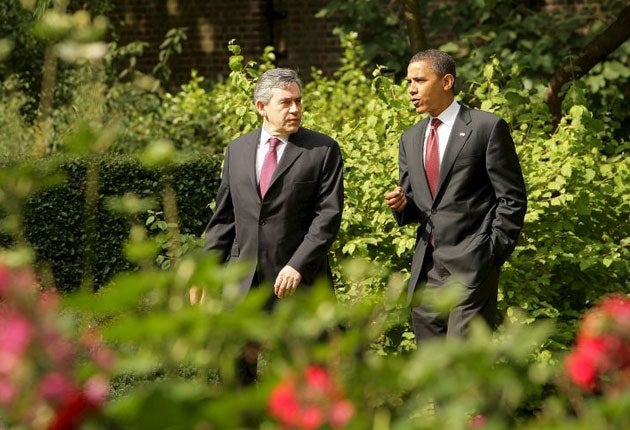The special relationship: Brown faces battle for new President's ear

In public, Gordon Brown pays tribute to the outgoing George Bush for fighting global terrorism. In private, most British ministers could not wait to see the back of him. "The worst US President in history," snapped one cabinet minister.
Mr Brown told his Cabinet yesterday that Britain would have a close relationship with the Obama administration because of their "shared values" on the economy, the President's top domestic priority, and the environment. The new regime will boost the prospects for a global agreement on climate change at talks in Copenhagen in December.
Mr Brown will urge Mr Obama to back practical international action to limit the scale of the global downturn. He wants less grandiose talk about a new Bretton Woods agreement covering bodies like the International Monetary Fund and more emphasis on immediate co-operation to oil the wheels of the world economy. Top of his agenda will be ending the retrenchment under which banks have cut their lending abroad.
The two leaders have common ground on how to deal with the world's troublespots. They draw the same lessons from Iraq and hope to apply them in Afghanistan – that means less reliance on military might and more on building local security forces and talking to moderate local leaders to strengthen democracy and economic reconstruction. Mr Brown calls it a "hearts and minds" strategy. Yet there could be early tensions over Afghanistan; Britain will only send more troops if other Nato countries (particularly Germany) do the same. How much influence will Britain enjoy? The economic crisis should give Mr Brown a seat at the top table but he is preparing for "Obama snubs Brown" headlines. He may not be the first European leader Mr Obama phones or invites to the White House – while France no longer holds the EU's rotating presidency, Nicolas Sarkozy may have sneaked an early invite, given France held the post until last month.
David Miliband, the Foreign Secretary, said despite media "froth" about the race for White House invitations, the shared values and "deep relationships" between Britain and the US were more important than the timing of their leaders' meeting.
Mr Brown may have the last laugh at Mr Sarkozy's expense. Mr Obama will come to London on 2 April for an economic summit. He will not go to Strasburg for a summit to mark the 60th anniversary of Nato until the following day.
Liam Byrne, the Cabinet Office minister, said David Cameron's pitch as Britain's "change candidate" had been ruined by his "increasingly isolated opposition" to the sort of fiscal stimulus the new President would soon unveil.
"What Cameron misunderstands is that oppositions cannot set themselves up as champions of change if they embody the very values that people are turning their backs on," he said. What Barack Obama has outlined since the onset of the financial crisis is that government needs to do more, not less."
Mr Cameron said the Tories shared Mr Obama's "social responsibility" vision. "He's saying, 'We are all in this together and we have all got to bring this change about' and I think that is both powerful and true. Real change only happens when everyone plays their part."
Subscribe to Independent Premium to bookmark this article
Want to bookmark your favourite articles and stories to read or reference later? Start your Independent Premium subscription today.

Join our commenting forum
Join thought-provoking conversations, follow other Independent readers and see their replies